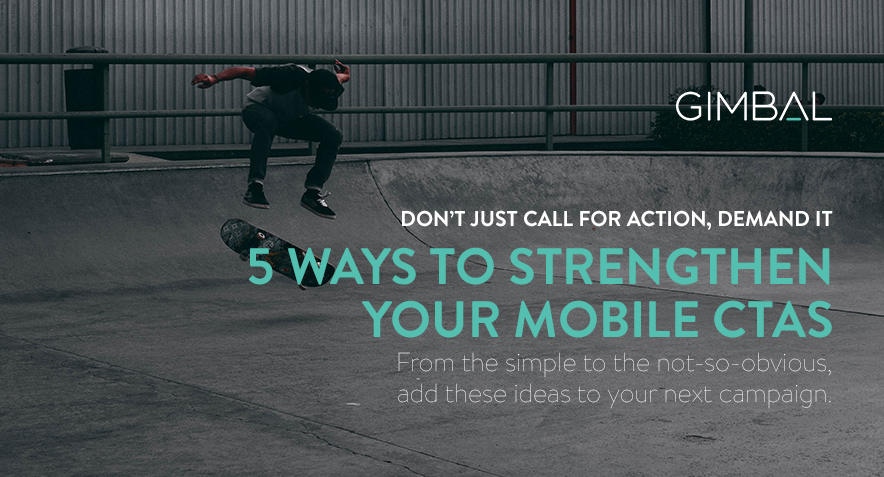Getting someone to do something is hard.
Think about it.
How often do you do something? Especially when you don’t have to do it.
I’m going to assume that it probably isn’t very often (unless you wake up in the morning like this).
Because it’s just way easier not to do something than it is to do it.
It’s laughably simple… and maybe a bit sad.
So when you are on your smartphone or tablet, what is it that successfully compels you to do something, to take an action, to touch a button – especially if you weren’t originally planning on doing so?
The answers to those questions power the psychology behind call-to-actions (or CTAs). They’re the closest thing we marketers and advertisers have to mind control.
Great CTAs are designed to be seductive, alluring and – most importantly – irresistible. They call to you, beg you to follow them, to uncover their rich bounty of rewards.
And the best CTAs? Those CTAs lead to conversions – the holy grail of all digital advertising.
With that in mind, here are a five tips on how to build killer, seductive, conversion-gettin’ mobile ad CTAs for your next campaign.
1. Smartphones Are Pretty Smart
First lesson: never forget where you’re advertising.
If you’re reading this post, chances are good you have mobile on your mind. Those wonderfully sophisticated, personal, customizable little rectangles of technological magic make our lives oh so much easier (theoretically).
And here’s the thing, mobile devices can do a lot of things that traditional desktops can’t.
They can vibrate, call, use voice commands, use GPS, and take pictures.
While you might not necessarily use all of these features in your call-to-actions (especially not all at once!), it is important to remember how unique the mobile experience can be.
For example, having a simple “call” CTA can give your audience the ability to redeem a reward right then and there.
Give your audience the instant gratification they seek. And use their smart devices to do it.
2. Remember: They Are Human
With so much time spent willing our digital tools to do what we want them to do, we can often forget that the target of all our advertising efforts is decidedly un-mechanical.
Human beings.
They’re a fickle lot, aren’t they?
You can’t just punch in a data sequence and expect them to respond.
They must be reasoned with, negotiated with, and even pandered to.
So don’t try to sell them something. Humans hate that.
Instead, nip at their curiosity, present them with an opportunity, or even entertain them. More than likely, your audience is on its phone to either gather information or seek a pleasant distraction.
If you know what they’re looking for (and with big data and advanced mobile analytics you often can), then you can be the one to give them that information, or provide them with that distraction they so-desperately seek.
And if you’re really good, they won’t even realize they’re interacting with an ad. Your CTA will loom as an opportunity to redeem an enticing award, share a valuable piece of content, or even play a game.
That’s when you have them right where you want them…
3. Convince Them With Color
There isn’t an overly-complex formula to know when picking the right color for your CTA.
The only thing to remember is this: make sure your CTA button actually looks like a button.
In other words, make sure the part you most want people to interact with stands out from the rest of your unit.
Especially when advertising on mobile devices with dynamic rich media ads, your CTA might have to compete for attention. And since mobile screens don’t have a ton of real estate, letting users know where you want them to place their finger must be strategic.
Your CTA should contrast heavily with the rest of your ad. Make it bright. Make it bold. Give it a shadow.
Whatever color screams “press me” is the color you should pick.
4. Create a Consistent Journey
Try not to think of your CTA as an isolated, one-time action that your audience must take.
Rather, it’s one step in a much larger sequence.
The language, verbage, and tone of your CTA should mirror that of the entire ad. Everything in the ad, from the copy to the imagery to the interactive content should funnel your audience through to your CTA.
Think of your CTA as the second punch in a boxer’s patented one-two combo. The first punch (your ad) implants the idea – your message – in your audiences’ head. The second punch (your CTA) gives your audience the ability to act on that idea.
Make the user journey as smooth as possible – no delays, no turbulence.
You are their pilot. Fly them home.
5. Don’t Call for Action, Demand It
This may seem rather aggressive, but demanding action is really just another way of saying, “be direct.”
Tell your audience what you want them to do! Give them an actionable command. Use direct verbs like “click,” “call,” “share,” and “play.”
It starts to sound like spoon-feeding, but it really works. Any ambiguity in what you want your audience to do can create uncertainty and doubt, and that spreads like wildfire.
Don’t give them the opportunity to turn away.
If your ad peaks their interest, they’ll want to take action now. And that’s exactly when you want them to act, because in 10 seconds (if that) they’ll be gone, having moved on to the bevy of other things jockeying for their attention.
So don’t be passive. Don’t just call. Demand.
And you shall receive.

